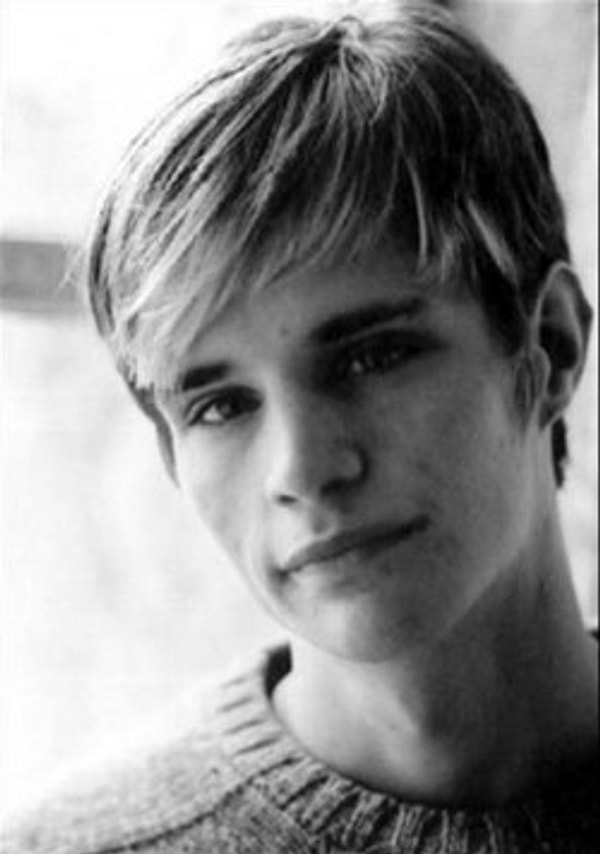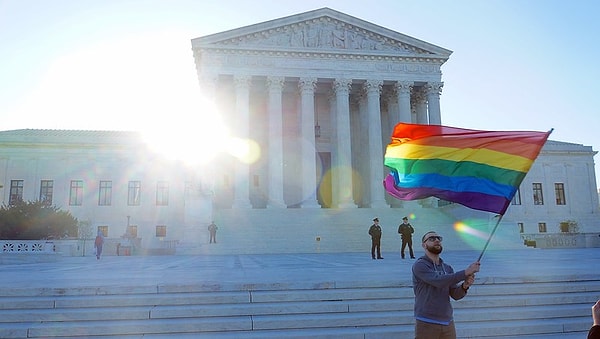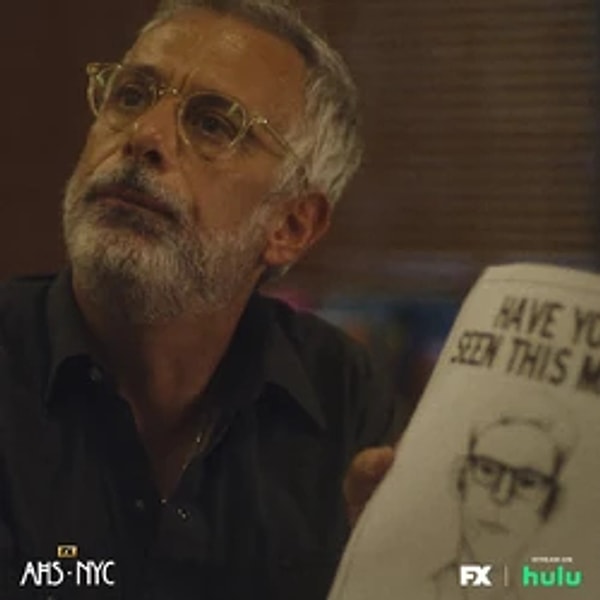Invoking Shachath: How Death and Rage Can Change the World in 'American Horror Story'
Warning: This article contains spoilers for 'American Horror Story: NYC' episode 8.
On March 9, 1969, a homosexual man named Howard Elfland was beaten to death by LAPD.
On June 24, 1973, a gay bar in New Orleans, Upstairs Lounge, was burnt down. 32 people were killed in the fire.
On November 27, 1978, Harvey Milk, the openly gay city supervisor of San Francisco was assassinated by his political rival, Dan White, at City Hall. Outrage over the incident and White's short sentence--which lasted only 5 years--led to what is now known as the White Night riots.
In January of 1979, Tennessee Williams was attacked by 5 teenage boys in Key West, Florida. He barely escaped serious injury. The attack was part of a larger spree of anti-gay violence inspired by a newspaper run by a local Baptist minister.
On January 1, 1982, John Hanson and Rick Hunter were beaten by police outside the Y'all Come Back Saloon in Minneapolis. Hospital workers testified that the police referred to them as 'f*ggots' while their wounds were being treated.
On October 27, 1992, U.S. Petty Officer Allen Schindler was stomped to death by his shipmate in a public restroom in Japan. He had been making multiple complaints about anti-gay harassment in the service. His name was used to justify the military's 'Don't Ask, Don't Tell' policy. It made it impossible for service members to report harassment, and it allowed the armed services to justify discharging someone for their sexual orientation and gender identity.
In 1993, Brandon Teena, a FTM trans man was violated and murdered when his birth sex was revealed to his male friends. The events leading up to his death were chronicled in the film Boys Don't Cry.
On March 9, 1995, Scott Amedure was murdered after an appearance on 'The Jenny Jones' show, where he confessed to having a secret crush on his friend Jonathan Schmitz. Schmitz purchased a shotgun, shot him, then turned himself in to the police.
On February 21, 1997, a lesbian nightclub in Atlanta, Otherside Loung, was bombed by a man named Eric Robert Rudolph. Five people were injured. He had committed several previous bombings and later confessed that he believed homosexuality was an aberrant lifestyle.

Harvey Milk Memorial, Courtesy of Haydn Blackey via Flickr
We remember them. We honor them, and offer our sincerest gratitude for their sacrifice. But there is one story, more than any other, that truly stood the test of time. On October 7, 1998, Aaron McKinney and Russell Henderson offered a man named Matthew Shepard a ride home from the Fireside Lounge in Laramie, Wyoming. They drove to a remote area to mug him, steal his wallet, and leave him for dead. Instead, driven by the knowledge that he was a homosexual, they tortured him, beat him, and pistol-whipped him. They then tied him to a barbed wire fence and left him to die in freezing temperatures. It's been said that Matthew's entire face was covered in blood, save for the lines where tears had streamed down his cheeks.
The two men drove back into town, got into another fight, and the police found a bloody shotgun and Matthew's credit card inside their truck. Matthew was discovered the next day by a bicyclist, Aaron Kreifels. He had been beaten so badly that Kreifels mistook him for a scarecrow. He was rushed to a hospital in Laramie and then subsequently transferred to a trauma ward in Fort Collins, Colorado. There it was determined that his wounds were too severe to operate on, even though he had faced trauma to his brain stem.
This was the second time that Matthew had been a victim of a hate crime. He was beaten and violated on a high school trip to Morocco, and it left him scarred. He fell into depression, and there were rumors of addiction. Perhaps that's why his loved ones were so quick to put out a call for support. As he lay comatose in Colorado, candles were being lit all across the world. Prayers were sent out, and anger was stirring. But he was fated for death. Shachath came to offer her kiss at 12:53 AM, October 12, 1998.

Matthew Shepard via Wikimedia Commons
On October 4, 2002, Gwen Amber Rose Araujo was beaten, tied up, and strangled by a group of four men, two of which she had slept with. They were angry because they suspected she might be transgender. One actually vomited over a misguided identity crisis--convinced that it would make him gay--a true sign of his intelligence and maturity. When they finally exposed her genitalia, Gwen begged for her life. She apologized. She pleaded. She tried to run. She told them that she had family and that she didn't want to die, and they still proceeded to kill her.
During her trial, she was disrespected by everyone, including the prosecutor who refused to call her 'she' out of principle. It was insult to injury--or in this case, murder in cold blood. They actually had to file a motion to change her name just so they could put a stop to it. Imagine being a mother at your child's murder trial watching everyone taking every opportunity they could to shame her--that's after learning about her death. Transphobia became a serious barrier to conviction. Her murderers planned her death out carefully over a period of several days. They tricked her into coming to a house party, where they forced her to reveal herself, and they had plenty of time to consider their actions. They even left the scene to get a shovel and a pickaxe. But the courtroom had trouble recognizing this because of what is called the gay panic defense.
The idea is that an act cannot be considered premeditated if the offender is panicking over someone's gender identity or sexuality. Lawyers will say murder is a reasonable response to such a thing, and people bought it. The monsters who killed her were given lesser sentences, and only after the first trial was thrown out. All but one of the men has been released. The experience was so horrific for Gwen's mother that she was traumatized and unable to work. She currently sleeps where she can and moves her stuff from one loved one's house to the next using a borrowed car.

Courtesy of Ted Eytan via Flickr
Rage
Matthew Shepard and Gwen Araujo both had their graves pissed on by the gay panic defense--as did many of the victims in the list above--that's along with bad politics and prejudice--bile so filthy it should send chills down the spines of millions. The way they were treated, before and after their death, is a testament to our origins as primates, and anyone who says otherwise should be crying and huddled up in a fetal position from shame. Politicians and voters in several states have continuously refused to throw out gay panic. There's absolutely no reason for this archaic practice to continue, not unless you think killing members of the LGBTQ community is a lesser crime, but somehow they've managed to justify their barbarism.
There's no doubt that these were hate crimes. These defendants are violent, demented individuals, many of whom were already fated for prison. They were not upstanding members of society. They were criminals, addicts, and monsters--all of them, and many of them were given leniency.
Something has to be done to give the victim's families justice. People will spend their entire lives with an open, bleeding wound. They'll develop serious PTSD, have flashbacks, panic attacks, and paranoia. It's bad for both the body and the mind, and they tend to sleep better at night when they know their child's killer isn't being treated like a king with a 5-year sentence. Murder is murder regardless of whatever color of the rainbow the victim belongs to. But we can't even agree on how to treat hate crimes. The Matthew Shepard Act didn't pass until 2009--eleven full years after his death, and it was fought vigorously by people who could never stand up in front of the public and give an honest, direct answer as to why they opposed it. It's not unfair or wide-reaching. It's pretty simple: hate crimes should be prosecuted as such. It doesn't go much further than that. Before its passage, federal law stated that hate crimes only occurred when someone was taking part in a protected activity like voting or going to school. That's not the case in all states, of course. But on a federal level that's how far we've come. There are still people that are fighting to remove the LGBTQ+ community from the protected list, and that deserves a moment of shame. There's no civilized justification for that--none, even if you think gays are depraved sinners. We're talking about being soft on murder because you don't like someone. That's not a mature, principled stance. It's an admission of guilt, and it comes after decades of having crimes against these individuals ignored.

Courtesy of FX
In episode 7 of 'American Horror Story: NYC,' Gino Barelli sits down at his typewriter to address a group of current and potential victims, all of whom lived their lives knowing that the world at large hated them. He talked about the sentinel, created by the Mai Tai Killer, Whiley. It was a mishmash of body parts--a brain taken from someone with extraordinary intelligence, arms, legs, and torso chosen for their aesthetic appeal--all sewn together from dead members of the community. The idea was that once Whitely brought the Sentinel to life, he would serve as their protector, a symbol of the death and mayhem wrought against hate crime victims. He would show that the rage they feel, their pain, and their suffering had life--and it does.
When Matthew Shepard died, the world heard about it. His mother grabbed a megaphone, shouted her grief to everyone that would hear, and she brought the fight to the masses. She used to run television commercials where she'd talk about the crime--how he was left there, tied to the fence, blood on his face, his body unrecognizable. Everyone knew. They would laugh, of course. This was the late 90s and early 2000s. Many people would talk about how he deserved it, and they'd use that sentiment to mock gays, trans individuals, and lesbians, saying they deserved it too.
But there were many that heard her call. They felt her pain, even if they were prejudiced, and they said that nothing could justify what happened to him. We owe a lot to his death--the nature of it and the message that spread across the world. In many ways, he was able to swing the pendulum in favor of justice. People began to see the community in a better light. He was their sentinel, and so was Gwen. Their names were remembered.

Courtesy of FX
'American Horror Story: NYC' is a collage of suffering, based on historic serial killers, disappearances, police discrimination, and the AIDs crisis. It's meant to show--just like Whitely's Sentinel--how each and every drop of blood spilled pushed the community to the point where they could kiss in public, live in relative safety, and find justice for the crimes against them.
But the overall message is bleaker than that: Get mad, stay mad, and continue using that rage to fight for your rights. Crimes are still being committed. Members of the community are still hated, and there are still people who believe that they shouldn't have the right to live freely and be who they want to be.
Equality is not the norm. It is an extraordinary exception, especially when it comes to LGBTQ+ rights, and that is not something we should forget. The community has only had about 10 years of relative acceptance, and it's easy to become complacent in that. There have been many periods in history where two men could hold hands walking down the street, and they haven't lasted. It comes in waves. Rage, sentiment, and a strong fighting spirit might be necessary to carry the torch and protect what we have today. Listen to Gino.
Keşfet ile ziyaret ettiğin tüm kategorileri tek akışta gör!

Send Comment